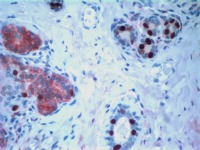Cancer Stem Cell Vaccine in Development Shows Antitumor Effect
Written by Nicole Fawcett
Stem cells had greater effect than differentiated tumor cells in eliciting antitumor immunity in vivo.
Antibodies and T cells targeted cancer stem cells in laboratory models.
Data could provide a rationale for a new type of immune therapy.

PHILADELPHIA - Scientists from the University of Michigan Rogel Cancer Center may have discovered a new paradigm for immunotherapy against cancer by priming antibodies and T cells with cancer stem cells, according to a study published in Cancer Research , a journal of the American Association for Cancer Research .
"This is a major breakthrough in immunotherapy research because we were able to use purified cancer stem cells to generate a vaccine, which strengthened the potency of antibodies and T cells that selectively targeted cancer stem cells," said Qiao Li, Ph.D., a research assistant professor in the department of surgery at the University of Michigan.
Cancer stem cells are tumor cells that remain present, and ultimately resistant, after chemotherapy or radiation treatment. Scientists disagree on whether these cells have unique properties, but those who support the uniqueness idea have argued that these cells regenerate the tumors that lead to relapse.
Despite the similar name, cancer stem cells are distinct from embryonic stem cells, and the two avenues of research are separate.
For the current study, Li and colleagues extracted cancer stem cells from two immunocompetent mouse models and used them to prepare the vaccine.
"We found that these enriched cancer stem cells were immunogenic and far more effective as an antigen source compared with the unselected tumor cells normally used in previous immunotherapy trials," said Li. "The mechanistic investigations found that when antibodies were primed with cancer stem cells, they were capable of targeting cancer stem cells and conferring antitumor immunity."
The researchers also found that cytotoxic T lymphocytes harvested from cancer stem cell-vaccinated hosts were capable of killing cancer stem cells in vitro.
About the AACR
Founded in 1907, the American Association for Cancer Research (AACR) is the world's first and largest professional organization dedicated to advancing cancer research and its mission to prevent and cure cancer. AACR's membership includes 34,000 laboratory, translational and clinical researchers; population scientists; other health care professionals; and cancer advocates residing in more than 90 countries. The AACR marshals the full spectrum of expertise of the cancer community to accelerate progress in the prevention, biology, diagnosis and treatment of cancer by annually convening more than 20 conferences and educational workshops, the largest of which is the AACR Annual Meeting with more than 18,000 attendees. In addition, the AACR publishes seven peer-reviewed scientific journals and a magazine for cancer survivors, patients and their caregivers. The AACR funds meritorious research directly as well as in cooperation with numerous cancer organizations. As the Scientific Partner of Stand Up To Cancer , the AACR provides expert peer review, grants administration and scientific oversight of individual and team science grants in cancer research that have the potential for patient benefit. The AACR actively communicates with legislators and policymakers about the value of cancer research and related biomedical science in saving lives from cancer. For more information about the AACR, visit www.AACR.org .
